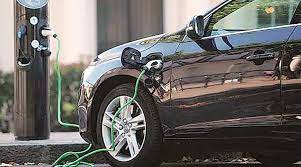Maharashtra, Delhi and UP have have most comprehensive EV policies, reveals report
By Lokmat English Desk | Published: February 17, 2023 06:01 PM2023-02-17T18:01:55+5:302023-02-17T18:02:32+5:30
Delhi, Maharashtra, Haryana, and Uttar Pradesh have the most comprehensive electric vehicle policies with the widest range of parameters, ...

Maharashtra, Delhi and UP have have most comprehensive EV policies, reveals report
Delhi, Maharashtra, Haryana, and Uttar Pradesh have the most comprehensive electric vehicle policies with the widest range of parameters, including budget allocations, charging infrastructure and job creation, according to a new study.
The study by Climate Trends, Analysis Of State Electric Vehicle Policies And Their Impact, assesses the comprehensiveness of EV policies of 26 states and Union territories based on 21 parameters. Arunachal Pradesh, Manipur, Himachal Pradesh, Ladakh, Kerala, and Uttarakhand offer between three to seven of the 21 defined parameters in their policies, making them the least comprehensive, it said.
Of the 26 states and UTs which have released EV policies over the last five years, 16 of them have been released between 2020 and 2022, it said.
None of the eight states Andhra Pradesh, Bihar, Karnataka, Kerala, Madhya Pradesh, Tamil Nadu, Telangana and Delhi that released their policies before October 2020 are on track to meet their targets of EV penetration, charging infrastructure or investments, the report said.
It said EV policies of the nine states and UTs – Delhi, Odisha, Bihar, Chandigarh, Andaman & Nicobar, Maharashtra, Haryana, Rajasthan and Meghalaya have the strongest demand side incentives.
Tamil Nadu, Haryana and Andhra Pradesh have the strongest supply side incentives, with special support to boost EV manufacturing, apart from incentives offered in the state’s industrial policy, it said.
Only nine states Chandigarh, West Bengal, Andhra Pradesh, Tamil Nadu, Odisha, Delhi, Maharashtra, Meghalaya, Ladakh have mandated the creation of charging infrastructure in new residential buildings, offices, parking lots, malls, etc, the report said.
Only eight states have specific targets for electrification of fleets such as last mile delivery vehicles, aggregator cabs, government vehicles: Maharashtra, Delhi, Haryana, Karnataka, Assam, Madhya Pradesh, Manipur, Andaman & Nicobar.
It is a good sign that the majority of Indian states have EV policies, however a successful transition to zero emission transport depends on the effectiveness of their design and implementation, said Aarti Khosla, Director, Climate Trends.
Electrification of public transport is lagging across all eight states. Tamil Nadu aims for five per cent of buses to be electric, but has no e-buses on ground yet. Kerala aims for 6,000 buses by 2025 but has only 56 on ground, it said.